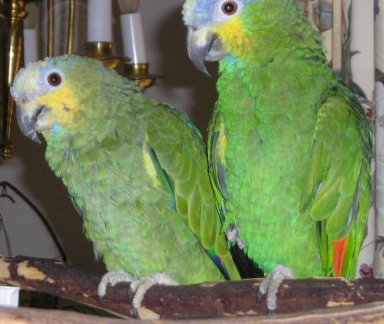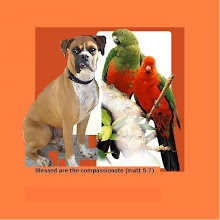forever home found 11-2-07 Orange wing amazons (proven pair, must stay together) thanks to all who sent in emails and applications on this pair.
------------------------------------------------
this pair is in excellent health and feather, proven breeding pair, parented many clutches together. They will add to your family and provide many nice babies for you. These are very calm parrots, fair talkers, very smart and enjoy taking hand fed small treats daily. Exceptionally Quiet Pair!!! VERY CALM bonded to each other, no fussing or stressing when I enter cage to move toys or clean.
Quite the Lady and Gentleman.. Very healthy birds, no feather plucking or illness ever, They will be needing medium-large size cage with lots of toys. They are used to out of cage time daily when im not breeding them, Enjoy snacking from my dinner plate, and sitting on their jungle gym on top of their cage. THEY have been laying for us up to three eggs:- three times a year. BE SURE if you are interested in any of our birds that you include info on your bird experience and current Birds and pets in house . NON smoking households prefered, birds are very sensitive to inhailants. Persons Over 23 yrs of age prefered and your full name and address and a phone number required also so we can reach you to discuss adoption. thanks. click here to Email us
about orange wing amazons:
Scientific Name -Amazona amazonica , Distribution -Northern - Central South America , Description -Weight: 350-600 gm Size: Approximately 12 inches in length., Distinct Markings: Overall green with black edging on back of neck. Cheeks and front of crown yellow, ear coverts green, violet to blue above eye. Wings green, tipped with blue, orange patch on secondaries. Tail green tipped with yellow, underside green, red and yellow. Eye ring pale grey, beak is bone and black, feet are grey.Amazons are short heavy bodied, stocky birds. Most species are predominately green with red, yellow, blue, white or orange markings. Amazons are well known for their ability to mimic and also to use the words and phrases they have learned appropriately.
Behavior/Aviculture - Amazons are very intelligent and lively, sometimes hyperactive birds. Young hand-raised amazons adapt readily to their new surroundings are can usually be handled by anyone. Mature amazons tend to form strong bonds to a single person, often adopting that person as their "mate" and showing aggressive behavior towards others.
Amazons are playful and love to chew. They enjoy time spent with their owners and quickly learn to talk. They should always be provided with toys, especially wooden blocks which can be chewed, and branches from nontoxic trees. In order to ensure safety companion amazons should not be allowed unsupervised freedom in the home as they often encounter toxins or dangerous items. Young amazons should be socialized to many people and exposed to a variety of situations such as new cages, toys, visits to the veterinarian, handling by friends and wing and nail clippings to avoid fear of novel situations.
Routine bathing or showering is vital to maintaining good plumage and skin condition. Birds can be misted and allowed to dry in a warm room or in the sun, or dried with a blow drier. Care should be taken not to clip the wing feathers excessively as amazons may fall and injure themselves. Clip only enough so the bird will glide to the floor.
All companion and breeding birds should be individually identified to assist in recovery if lost and assist in maintenance of medical and genealogical records. Many breeders apply closed leg bands when chicks are young. While they present a slight risk of entrapment closed bands are preferable to no identification, especially for breeding birds. Microchips which can be implanted into the muscle or under the skin are a reliable means of identification but require electronic readers to verify identification. Tattoos may be used but often fade or become illegible with time. Foot prints may have some application in identification.
Amazons are active birds and should be allowed as much space as possible. The cage should have at least perches that the bird can move between. Appropriate, safe toys should be provided.
Life Span: 20-60 years. Age at maturity: 2-5 years.
Diet - Amazons should be fed a formulated (pelleted or extruded diet) as a basis for good nutrition. The diet should be supplemented with fresh fruits and vegetables daily to add variety and psychological enrichment. Treats maybe given in small amounts especially as rewards for good behavior.
Due to a tendency to become obese in captivity, amazons should be fed restricted calorie diets (low fat). During the non-breeding season Fresh clean water must be provided every day. Vitamin supplements are not needed for birds which are eating a formulated diet. Pretty Bird manufactures special low fat diets which are appropriate for most amazons. For Conversion see our brochure on; Converting your seed eating bird to a formulated diet.
Breeding Information - Most amazons breed in the spring and typically produce a single clutch of 2 to 5 eggs. If the first clutch is removed from the nest they will often lay a second clutch. While some pairs will breed at other time of the year, the breeding season for amazons is typically very limited.
Nest Box - Most amazons breed well in a vertical boxes, the size being dependent upon species but typically 18" x 18" x 24 -30". Due to a tendency for obesity in captivity Amazons should be allowed space to fly. Mate aggression is a problem with some species.
Most species show no obvious sexual dimorphism (visual difference between the species) therefore endoscopic examination or laboratory sexing techniques are needed for accurate sex determination. Males tend to be larger with larger heads than females.
HOME PAGE
http://featheredfriendscastleread.blogspot.com/
Surrendering your Parrot
http://parrotsurrender.blogspot.com/
Want to adopt one of our parrots? see who we have
http://adoptablebirds.blogspot.com/
Tags: adoption, birds, parrot, amazon, orange wing, for sale, breeder, pair




